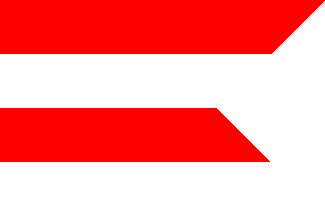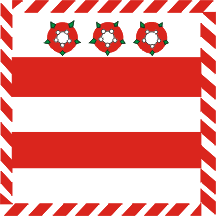This page is best viewed with ISO:8859-2, aka Latin2, aka Central European fonts See also:
Prešov flag
 submitted through Rob Raeside, 27 July 1999
submitted through Rob Raeside, 27 July 1999
Prešov (Hungarian: Eperjes; German: Eperies or Preschau; Ruthenian Prjašiv
has 87.765 inhabitants (0,9% Hungarians, more Ruthenians; 1990 census).
In 1910: 16.323 inhabitants (48,9% Hungarian, 39,8% Slovakian, 8,6% German
and 1,0% Rumanian). The city was the capital of Sáros (in Slovakian Šaríš)
County of Hungary until 1918/1920 (Declaration of Martin). 1920-1938 Czechoslovakian,
1939-1945 Slovakian, and 1945-1992 Czechoslovakian. In 1919 the city was
the capital of the Slovakian Soviet Republic for some days. The city lies
on the banks of the Torysa (Tarca) River. It was an important site in the
Age of the Halstatt Culture. Quads and Gepids lived there too. The city
was founded by King Béla II. in 1132. The king gave the name of the city
after the strawberries or mulberries (Eperjes or epres means strawberry
(fields)) - by the Legend. It is first mentioned in 1233. The city became
a free Royal Town in 1324 by King Charles. In 1687 the "Hangman of
Prešov", General Caraffa tormented 300 citizens and their 24 leader
were executed. In 1849 the Slovakian Revolt in opposition to the Hungarian
Revolution was begun. The leader of the Revolt in Prešov was Hurban. The
City is the center of the Ruthenians in Slovakia
István Molnár, 26 Jun 2000
Prešov mayor's flag
 image by Jarig Bakker, 6 Sep 2006
image by Jarig Bakker, 6 Sep 2006
Looking at your page for Presov city, Slovakia, I would like to offer
the info on a new
web page, which includes the Mayor's standard.
John Udics, 6 Sep 2006
Prešov old flag
![[Presov old flag]](../images/s/sk-po15.gif) by Jan Kravcik, 16 June 2000
by Jan Kravcik, 16 June 2000
The old flag of the city - the blue and yellow colours came from the
old coat of arms of 1558.
Jan Kravcik, 16 June 2000
Prešov Coat of Arms
preso.gif) from http://www.tatrahome.sk/revue/erby/ . (!Link does not work any more!)
from http://www.tatrahome.sk/revue/erby/ . (!Link does not work any more!)
The town emblem consists of Gothic Shield, that has a silver head with
three roses in it. The lower part is three times divided (red and silver
stripes). The town colours are red and silver.
Source: Prešov
city website.
Is there any possibility to see what the old coat of arms of 1558 looks
like?
John Udics, 6 Sep 2006
Ralf Hartemink
writes: "The oldest arms of Prešov date from the early 15th century and
showed a strawberry. The strawberry was canting for the Hungarian name
of the city Eperjes (eper=strawberry). When the Hungarian
elite decreased the city adopted new arms with three roses. The present
arms were granted in 1453 and haven't changed since.
Literature : Kartous et al, 1991; Slowakei - Spaziergänge durch
die Jahrhunderte der Städte und Städchen. Piroda, Bratislava, 1994 (German
version, ISBN 80-07-00531-5); Kartous and Vrteľ , 2000".
Jarig Bakker, 6 Sep 2006
